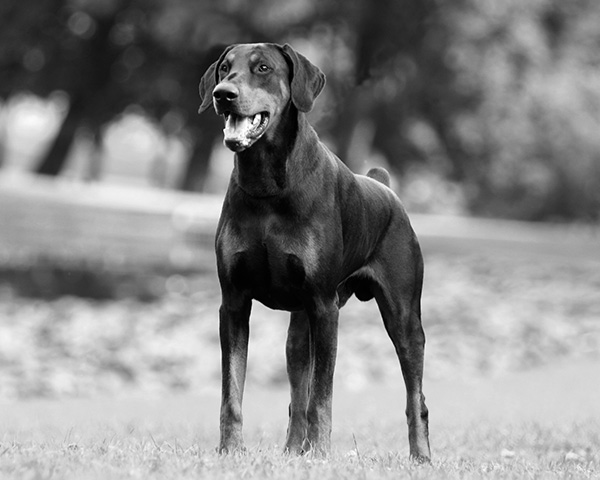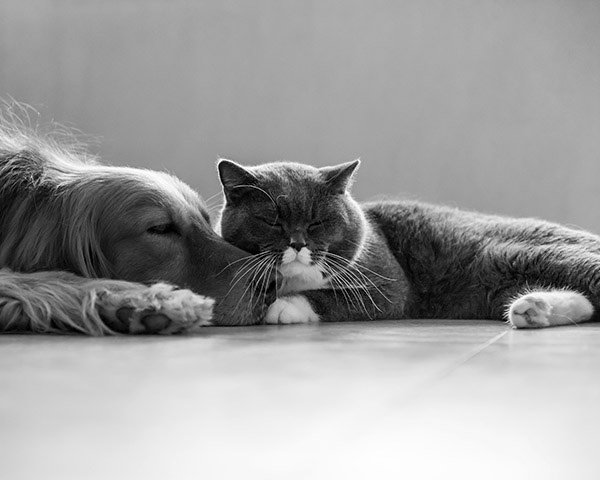Doberman breed information and advice
First bred in the 19th century in Germany by Karl Friedrich Louis Dobermann, the Doberman Pinscher is a large, strong breed of dog. Their loyal, intelligent and protective nature made them popular as police and guard dogs. Dobermans were even used as sentry dogs and messengers during the world wars.
But these sleek and majestic dogs also make popular family pets. If you’re considering welcoming a Doberman into your home, this helpful guide gives you everything you need to know. Learn about Doberman temperament, health issues, grooming, training and much more.
Doberman facts

| Lifespan | 10 - 13 years |
| How much | £1000 - £2500 |
| Size | 63 - 72 cm |
| Weight | 32 - 45 kg |
| Colours | black & tan, red & tan |
| Grooming | brush once a week |
| Temperament | intelligent, fearless, obedient, energetic, loyal |
| Exercise | two hours a day |
Insurance for your Doberman
Doberman Pinschers – as with most pedigree dogs – are prone to developing certain health issues. These include:
It’s important to choose a Doberman puppy from a reputable breeder and check that both parents have had health checks before breeding. Make sure that your puppy has received the necessary vaccinations and health checks as well.
Pet insurance can help protect you financially if your Doberman is ill, injured or suffers from health issues. You can focus on training and playing with your pet without worrying about vet bills.
Sainsbury’s Bank Pet Insurance
We offer a range of pet insurance options for your Doberman, from time limited insurance insurance, to lifetime and maximum benefit. We also offer a range of cover levels to suit your needs and budget. Each option could help to protect you financially if your Doberman needs vet treatment.
You can take out new dog insurance cover for your Doberman with Sainsbury’s Bank from eight weeks of age. Once you have cover in place with us, you can insure them up to any age as long as you keep renewing the policy without a break. As with all insurances, policy limits, excesses and exclusions will apply.
How to care for a Doberman
Making sure your Doberman is well cared for is the best way to keep them fit, healthy and avoid visits to the vet.
Feeding and nutrition
The Doberman is a large dog, weighing between 32 and 45 kilos when fully grown. As such they need plenty of high-quality food as both puppies and adults to make sure they’re getting the right nutrition.
As a puppy you should feed your Doberman smaller meals 3-4 times a day. As they get bigger, adult dogs will only need to be fed once or twice a day. If you have your Doberman from a puppy, try to start by feeding them the same food as they ate with the breeder. Introduce new food gradually, mixing it with their current food over the space of a few weeks to avoid an upset tummy.
Most dog food packaging includes a guide for feeding quantities depending on your dog’s size, but you may also need to factor in activity level and age to make sure they’re getting the right portion size.
Grooming
Doberman dogs have short coats which only need a little bit of grooming. Brushing once per week will help to remove shedding hairs and keep them looking glossy and healthy. You may find more hair than usual in the spring and autumn as your Doberman sheds its coat, so more frequent brushing will help to keep this under control.
Exercise
Dobermans are an active breed that need plenty of exercise. Ideally, you should walk them for two hours every day, split into two hour-long walks. Training, enrichment toys and other mentally stimulating activities can also help to tire them out.
Training
Doberman’s are intelligent dogs and can be trained to perform a wide variety of tricks and tasks. They have been used as police dogs, guard dogs and messenger dogs in the past, and are quick to learn and eager to please.
As they’re a large breed, thorough training and socialisation from a young age is important to help your Doberman learn how to behave both at home and out and about.
They are a distinctive and somewhat intimidating breed for people who aren’t confident around dogs, so it’s important to keep your Doberman under control when out in public.
Teach the essentials like recall, loose lead training and house training from when they’re puppies.
Temperament and behaviour
Dobermans may have a fierce reputation, but in reality, they are gentle, loving and protective. They form strong bonds with their owners and families and will naturally protect and defend their territory. They don’t seek trouble with other dogs while out and about, and they aren’t generally aggressive without cause.
Common health problems
The Doberman Pinscher is generally considered a healthy breed, but they may be susceptible to some health conditions, including:
Bloat
Bloat is a medical emergency and can be life-threatening. The stomach fills with gas and can twist, cutting off blood supply to the gut and affecting circulation to the heart.
Symptoms include a swollen, hard belly, retching but not vomiting, drooling, pain in the abdomen and other signs of distress like panting and restlessness. It can kill dogs within a matter of hours, but thankfully the condition is extremely rare.
Hip Dysplasia
This is an inherited condition where the thigh bone and hip joint don’t fit together properly. It causes pain, especially when walking, and can lead to lameness in the back legs. Hip joints can be tested for this condition by the vet. Breeders shouldn’t mate dogs with hip dysplasia.
Dilated cardiomyopathy
This is a heart condition where the muscles in the heart become weaker and thinner, As the muscles weaken the heart pumps blood less effectively, leading to increased pressure which stretches the thin heart muscles. Some dogs develop abnormal heart rhythms or a heart murmur. Dilated cardiomyopathy is the most common cause of heart failure in some large dog breeds, including Doberman Pinschers.
- Signs of the condition can include:
- Rapid breathing even while resting
- Increased effort breathing
- Weakness
- Reduced ability to exercise
- Fainting or collapsing
- Weight loss
- Swollen belly.
Von Willebrand’s Disease
Von Willebrand’s Disease is an inherited blood disorder that means blood doesn’t clot effectively. Your Doberman may bleed excessively if they’re injured or after surgery.
Symptoms of Von Willebrand’s Disease include:
- Nosebleeds
- Bleeding gums
- Internal bleeding.
Blood transfusions from healthy dogs can help manage the condition.
So, is a Doberman right for you?
A Doberman Pinscher could make a loyal, obedient and watchful pet for the right owner. Their elegant stature, playful and loving temperament and minimal grooming needs can make them the ideal family pet. If you lead an active lifestyle and are confident with training, a Doberman may fit perfectly into your life.
However, as a large and somewhat intimidating breed, Dobermans aren’t suitable for everyone. You should be prepared to train, exercise and care for your dog, socialising them from a young age and teaching them how to behave around adults, children and other animals. A well-trained Doberman is obedient and good-natured, but without thorough and continuous training they can be a handful.
What is a Doberman?
A Doberman, or Dobermann, is a German Pinscher breed of dog. Large, muscular and powerful, Dobermans have been used as police dogs and guard dogs due to their intelligent, protective natures.
Are Dobermans dangerous?
The Doberman is loving and affectionate with its owner and family, but its large and powerful build means it does have the ability to be dangerous. However, they will only show aggression to those threatening their family or territory, which is what makes them excellent watch dogs.
How big is a Doberman dog?
A fully grown female Doberman will grow to 63 - 68cm and weigh 32 - 35kg, while males are slightly larger at 68 - 72cm and 40 – 45kg. This puts them into the large dog category.

Browse our guides
Choose from our list of helpful guides and information

Explore dog breeds
Find out how to keep your dog healthy and happy

Cat breed guides
How to care for your cat, common health problems and more
Frequently asked questions
Is a Doberman a good family dog?
Doberman’s can make great family pets due to their loving playful and protective nature. However, they are large dogs that need lots of exercise and thorough training to become a well-rounded member of the family.
Can you own a Doberman in the UK?
Yes, you can own a Doberman in the UK. The Doberman Pinscher isn’t on the UK banned dogs list, which means it’s perfectly legal to have a Doberman as a pet.
Historically Doberman dogs have had their ears cropped and tails docked to give them a more fearsome appearance. Ear cropping and tail docking is illegal in the UK under the Animal Welfare Act 2006, unless performed by a vet for medical reasons. However, some international breeders import cropped and docked Dobermans to the UK.
Why are Dobermans so special?
Dobermans have a wonderful temperament – loving, playful and obedient with their families, yet fiercely protective when they need to be. This combination makes them a popular pet for people who want a dog for extra protection.
Terms and conditions
Important information
* Guaranteed discount for Nectar members: The discount is based on information related to you and the transactions you've made with Sainsbury's supermarkets and Sainsbury's Bank using your Nectar card. For more information go to sainsburysbank.co.uk/nectar.
Sainsbury's Bank plc, Registered Office, 33 Charterhouse Street, London, EC1M 6HA (registered in England and Wales, no 3279730) is authorised by the Prudential Regulation Authority and regulated by the Financial Conduct Authority and the Prudential Regulation Authority (register no. 184514).
Sainsbury's Supermarkets Ltd is an appointed representative of Sainsbury's Bank plc. Sainsbury's Bank plc acts as an introducer to Pinnacle Insurance Ltd who is authorised by the Prudential Regulation Authority and regulated by the Financial Conduct Authority and the Prudential Regulation Authority (register number 110866). Registered office: 4th Floor, Limelight, Elstree Way, Borehamwood, Hertfordshire, WD6 1JH. Sainsbury’s Bank Pet Insurance is arranged, administered and underwritten by Pinnacle Insurance Ltd. Sainsbury's Bank plc and Pinnacle Insurance Ltd are not part of the same corporate group.
We do not provide personal recommendations to customers.
